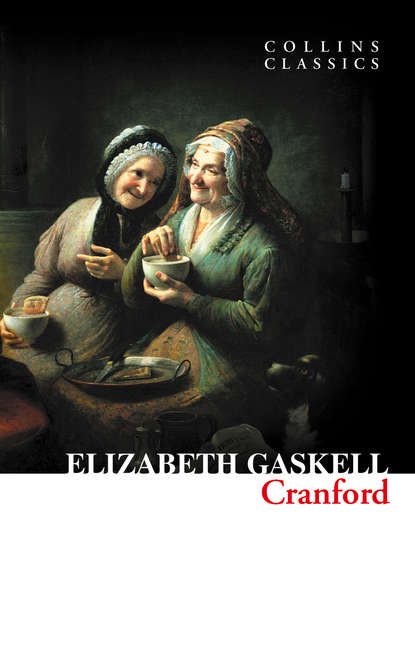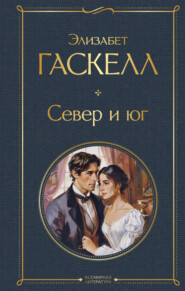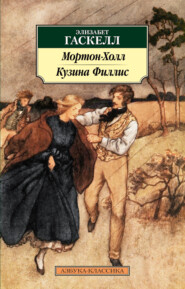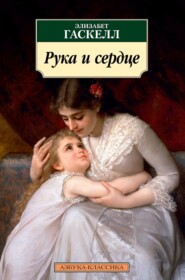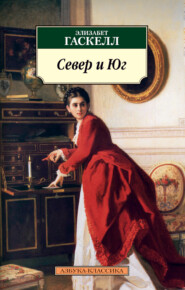По всем вопросам обращайтесь на: info@litportal.ru
(©) 2003-2024.
✖
Cranford
Настройки чтения
Размер шрифта
Высота строк
Поля
It was settled that Miss Pole was to remain with her all the watching livelong night; and that Miss Matty and I were to return in the morning to relieve them, and give Miss Jessie the opportunity for a few hours of sleep. But when the morning came, Miss Jenkyns appeared at the breakfast-table, equipped in her helmet-bonnet, and ordered Miss Matty to stay at home, as she meant to go and help to nurse. She was evidently in a state of great friendly excitement, which she showed by eating her breakfast standing, and scolding the household all round.
No nursing—no energetic, strong-minded woman could help Miss Brown now. There was that in the room as we entered which was stronger than us all, and made us shrink into solemn, awestruck helplessness. Miss Brown was dying. We hardly knew her voice, it was so devoid of the complaining tone we had always associated with it. Miss Jessie told me afterwards that it, and her face too, were just what they had been formerly, when her mother’s death left her the young anxious head of the family, of whom only Miss Jessie survived.
She was conscious of her sister’s presence, though not, I think, of ours. We stood a little behind the curtain: Miss Jessie knelt with her face near her sister’s, in order to catch the last soft, awful whispers.
“O Jessie! Jessie! How selfish I have been! God forgive me for letting you sacrifice yourself for me as you did! I have so loved you—and yet I have thought only of myself. God forgive me!”
“Hush, love! hush!” said Miss Jessie, sobbing.
“And my father! my dear, dear father! I will not complain now, if God will give me strength to be patient. But, oh, Jessie! tell my father how I longed and yearned to see him at last, and to ask his forgiveness. He can never know now how I loved him—oh! if I might but tell him, before I die! What a life of sorrow his has been, and I have done so little to cheer him!”
A light came into Miss Jessie’s face. “Would it comfort you, dearest, to think that he does know?—would it comfort you, love, to know that his cares, his sorrows—” Her voice quivered, but she steadied it into calmness: “Mary! he has gone before you to the place where the weary are at rest. He knows now how you loved him.”
A strange look, which was not distress, came over Miss Brown’s face. She did not speak for some time, but then we saw her lips form the words, rather than heard the sound—“Father, mother, Harry, Archy;”—then, as if it were a new idea throwing a filmy shadow over her darkened mind—“But you will be alone, Jessie!”
Miss Jessie had been feeling this all during the silence, I think; for the tears rolled down her cheeks like rain, at these words, and she could not answer at first. Then she put her hands together tight, and lifted them up, and said—but not to us—
“Though He slay me, yet will I trust in Him.”
In a few moments more Miss Brown lay calm and still—never to sorrow or murmur more.
After this second funeral, Miss Jenkyns insisted that Miss Jessie should come to stay with her rather than go back to the desolate house, which, in fact, we learned from Miss Jessie, must now be given up, as she had not wherewithal to maintain it. She had something above twenty pounds a year, besides the interest of the money for which the furniture would sell; but she could not live upon that; and so we talked over her qualifications for earning money.
“I can sew neatly,” said she, “and I like nursing. I think, too, I could manage a house, if any one would try me as housekeeper; or I would go into a shop, as saleswoman, if they would have patience with me at first.”
Miss Jenkyns declared, in an angry voice, that she should do no such thing; and talked to herself about “some people having no idea of their rank as a Captain’s daughter,” nearly an hour afterwards, when she brought Miss Jessie up a basin of delicately-made arrowroot, and stood over her like a dragoon until the last spoonful was finished; then she disappeared. Miss Jessie began to tell me some more of the plans which had suggested themselves to her, and insensibly fell into talking of the days that were past and gone, and interested me so much I neither know nor heeded how time passed. We were both startled when Miss Jenkyns reappeared, and caught us crying. I was afraid lest she would be displeased, as she often said that crying hindered digestion, and I knew she wanted Miss Jessie to get strong; but, instead, she looked queer and excited, and fidgeted round us without saying anything. At last she spoke. “I have been so much startled—no, I’ve not been at all startled—don’t mind me, my dear Miss Jessie—I’ve been very much surprised—in fact, I’ve had a caller, whom you knew once, my dear Miss Jessie—”
Miss Jessie went very white, then flushed scarlet, and looked eagerly at Miss Jenkyns.
“A gentleman, my dear, who wants to know if you would see him.”
“Is it?—it is not”—stammered out Miss Jessie—and got no further.
“This is his card,” said Miss Jenkyns, giving it to Miss Jessie; and while her head was bent over it, Miss Jenkyns went through a series of winks and odd faces to me, and formed her lips into a long sentence of which, of course, I could not understand a word.
“May he come up?” asked Miss Jenkyns, at last.
“Oh, yes! certainly!” said Miss Jessie, as much as to say, this is your house, you may show any visitor where you like. She took up some knitting of Miss Matty’s and began to be very busy, though I could see how she trembled all over.
Miss Jenkyns rang the bell, and told the servant who answered it to show Major Gordon upstairs; and, presently, in walked a tall, fine, frank-looking man of forty or upwards. He shook hands with Miss Jessie; but he could not see her eyes, she kept them so fixed on the ground. Miss Jenkyns asked me if I would come and help her to tie up the preserves in the store-room; and, though Miss Jessie plucked at my gown, and even looked up at me with begging eye, I durst not refuse to go where Miss Jenkyns asked. Instead of tying up preserves in the store-room, however, we went to talk in the dining-room; and there Miss Jenkyns told me what Major Gordon had told her; how he had served in the same regiment with Captain Brown, and had become acquainted with Miss Jessie, then a sweet-looking, blooming girl of eighteen; how the acquaintance had grown into love on his part, though it had been some years before he had spoken; how, on becoming possessed, through the will of an uncle, of a good estate in Scotland, he had offered and been refused, though with so much agitation and evident distress that he was sure she was not indifferent to him; and how he had discovered that the obstacle was the fell disease which was, even then, too surely threatening her sister. She had mentioned that the surgeons foretold intense suffering; and there was no one but herself to nurse her poor Mary, or cheer and comfort her father during the time of illness. They had had long discussions; and on her refusal to pledge herself to him as his wife when all should be over, he had grown angry, and broken off entirely, and gone abroad, believing that she was a cold-hearted person whom he would do well to forget. He had been travelling in the East, and was on his return home when, at Rome, he saw the account of Captain Brown’s death in Galignani.
Just then Miss Matty, who had been out all the morning, and had only lately returned to the house, burst in with a face of dismay and outraged propriety.
“Oh, goodness me!” she said. “Deborah, there’s a gentleman sitting in the drawing-room with his arm round Miss Jessie’s waist!” Miss Matty’s eyes looked large with terror.
Miss Jenkyns snubbed her down in an instant.
“The most proper place in the world for his arm to be in. Go away, Matilda, and mind your own business.” This, from her sister who had hitherto been a model of feminine decorum, was a blow for poor Miss Matty, and with a double shock she left the room.
The last time I ever saw poor Miss Jenkyns was many years after this. Mrs. Gordon had kept up a warm and affectionate intercourse with all at Cranford. Miss Jenkyns, Miss Matty, and Miss Pole had all been to visit her, and returned with wonderful accounts of her house, her husband, her dress, and her looks. For, with happiness, something of her early bloom returned; she had been a year or two younger than we had taken her for. Her eyes were always lovely, and, as Mrs. Gordon, her dimples were not out of place. At the time to which I have referred, when I last saw Miss Jenkyns, that lady was old and feeble, and had lost something of her strong mind. Little Flora Gordon was staying with the Misses Jenkyns, and when I came in she was reading aloud to Miss Jenkyns, who lay feeble and changed on the sofa. Flora put down the Rambler when I came in.
“Ah!” said Miss Jenkyns, “you find me changed, my dear. I can’t see as I used to do. If Flora were not here to read to me, I hardly know how I should get through the day. Did you ever read the Rambler? It’s a wonderful book—wonderful! and the most improving reading for Flora” (which I dare say it would have been if she could have read half the words without spelling, and could have understood the meaning of a third), “better than that strange old book, with the queer name, poor Captain Brown was killed for reading—that book by Mr. Boz, you know—‘Old Poz’; when I was a girl—but that’s a long time ago—I acted Lucy in ‘Old Poz.’” She babbled on long enough for Flora to get a good long spell at the “Christmas Carol,” which Miss Matty had left on the table.
CHAPTER 3 A Love Affair of Long Ago (#ulink_96adf552-6168-5085-b73f-1b10204731d4)
I thought that probably my connection with Cranford would cease after Miss Jenkyns’s death; at least, that it would have to be kept up by correspondence, which bears much the same relation to personal intercourse that the books of dried plants I sometimes see (“Hortus Siccus,” I think they call the thing) do to the living and fresh flowers in the lanes and meadows. I was pleasantly surprised, therefore, by receiving a letter from Miss Pole (who had always come in for a supplementary week after my annual visit to Miss Jenkyns) proposing that I should go and stay with her; and then, in a couple of days after my acceptance, came a note from Miss Matty, in which, in a rather circuitous and very humble manner, she told me how much pleasure I should confer if I could spend a week or two with her, either before or after I had been at Miss Pole’s; “for,” she said, “since my dear sister’s death, I am well aware I have no attractions to offer; it is only to the kindness of my friends that I can owe their company.”
Of course I promised to come to dear Miss Matty as soon as I had ended my visit to Miss Pole; and the day after my arrival at Cranford I went to see her, much wondering what the house would be like without Miss Jenkyns, and rather dreading the changed aspect of things. Miss Matty began to cry as soon as she saw me. She was evidently nervous from having anticipated my call. I comforted her as well as I could; and I found the best consolation I could give was the honest praise that came from my heart as I spoke of the deceased. Miss Matty slowly shook her head over each virtue as it was named and attributed to her sister; and at last she could not restrain the tears which had long been silently flowing, but hid her face behind her handkerchief and sobbed aloud.
“Dear Miss Matty,” said I, taking her hand—for indeed I did not know in what way to tell her how sorry I was for her, left deserted in the world. She put down her handkerchief and said—
“My dear, I’d rather you did not call me Matty. She did not like it; but I did many a thing she did not like, I’m afraid—and now she’s gone! If you please, my love, will you call me Matilda?”
I promised faithfully, and began to practise the new name with Miss Pole that very day; and, by degrees, Miss Matilda’s feeling on the subject was known through Cranford, and we all tried to drop the more familiar name, but with so little success that by and by we gave up the attempt.
My visit to Miss Pole was very quiet. Miss Jenkyns had so long taken the lead in Cranford that, now she was gone, they hardly knew how to give a party. The Honourable Mrs. Jamieson, to whom Miss Jenkyns herself had always yielded the post of honour, was fat and inert, and very much at the mercy of her old servants. If they chose that she should give a party, they reminded her of the necessity for so doing: if not, she let it alone. There was all the more time for me to hear old-world stories from Miss Pole, while she sat knitting, and I making my father’s shirts. I always took a quantity of plain sewing to Cranford; for, as we did not read much, or walk much, I found it a capital time to get through my work. One of Miss Pole’s stories related to a shadow of a love affair that was dimly perceived or suspected long years before.
Presently the time arrived when I was to remove to Miss Matilda’s house. I found her timid and anxious about the arrangements for my comfort. Many a time, while I was unpacking, did she come backwards and forwards to stir the fire, which burned all the worse for being so frequently poked.
“Have you drawers enough, dear?” asked she. “I don’t know exactly how my sister used to arrange them. She had capital methods. I am sure she would have trained a servant in a week to make a better fire than this, and Fanny has been with me four months.”
This subject of servants was a standing grievance, and I could not wonder much at it; for if gentlemen were scarce, and almost unheard of in the “genteel society” of Cranford, they or their counterparts—handsome young men—abounded in the lower classes. The pretty, neat servant-maids had their choice of desirable “followers”; and their mistresses, without having the sort of mysterious dread of men and matrimony that Miss Matilda had, might well feel a little anxious lest the heads of their comely maids should be turned by the joiner, or the butcher, or the gardener, who were obliged, by their callings, to come to the house, and who, as ill-luck would have it, were generally handsome and unmarried. Fanny’s lovers, if she had any—and Miss Matilda suspected her of so many flirtations that, if she had not been very pretty, I should have doubted her having one—were a constant anxiety to her mistress. She was forbidden, by the articles of her engagement, to have “followers”; and though she had answered, innocently enough, doubling up the hem of her apron as she spoke, “Please, ma’am, I never had more than one at a time,” Miss Matty prohibited that one. But a vision of a man seemed to haunt the kitchen. Fanny assured me that it was all fancy, or else I should have said myself that I had seen a man’s coat-tails whisk into the scullery once, when I went on an errand into the store-room at night; and another evening, when, our watches having stopped, I went to look at the clock, there was a very odd appearance, singularly like a young man squeezed up between the clock and the back of the open kitchen-door; and I thought Fanny snatched up the candle very hastily, so as to throw the shadow on the clock face, while she very positively told me the time half an hour too early, as we found out afterwards by the church clock. But I did not add to Miss Matty’s anxieties by naming my suspicions, especially as Fanny said to me, the next day, that it was such a queer kitchen for having odd shadows about it, she really was almost afraid to stay; “for, you know, miss,” she added, “I don’t see a creature from six o’clock tea, till missus rings the bell for prayers at ten.”
However, it so fell out that Fanny had to leave; and Miss Matilda begged me to stay and “settle her” with the new maid; to which I consented, after I had heard from my father that he did not want me at home. The new servant was a rough, honest-looking country girl, who had only lived in a farm-place before; but I liked her looks when she came to be hired; and I promised Miss Matilda to put her in the ways of the house. The said ways were religiously such as Miss Matilda thought her sister would approve. Many a domestic rule and regulation had been a subject of plaintive whispered murmur to me during Miss Jenkyns’s life; but now that she was gone, I do not think that even I, who was a favourite, durst have suggested an alteration. To give an instance: we constantly adhered to the forms which were observed, at meal-times, in “my father, the rector’s house.” Accordingly, we had always wine and dessert; but the decanters were only filled when there was a party, and what remained was seldom touched, though we had two wine-glasses apiece every day after dinner, until the next festive occasion arrived, when the state of the remainder wine was examined into, in a family council. The dregs were often given to the poor; but occasionally, when a good deal had been left at the last party (five months ago, it might be), it was added to some of a fresh bottle, brought up from the cellar. I fancy poor Captain Brown did not much like wine, for I noticed he never finished his first glass, and most military men take several. Then, as to our dessert, Miss Jenkyns used to gather currants and gooseberries for it herself, which I sometimes thought would have tasted better fresh from the trees; but then, as Miss Jenkyns observed, there would have been nothing for dessert in summer-time. As it was, we felt very genteel with our two glasses apiece, and a dish of gooseberries at the top, of currants and biscuits at the sides, and two decanters at the bottom. When oranges came in, a curious proceeding was gone through. Miss Jenkyns did not like to cut the fruit; for, as she observed, the juice all ran out nobody knew where; sucking (only I think she used some more recondite word) was, in fact, the only way of enjoying oranges; but then there was the unpleasant association with a ceremony frequently gone through by little babies; and so, after dessert, in orange season, Miss Jenkyns and Miss Matty used to rise up, possess themselves each of an orange in silence, and withdraw to the privacy of their own rooms to indulge in sucking oranges.
I had once or twice tried, on such occasions, to prevail on Miss Matty to stay, and had succeeded in her sister’s lifetime. I held up a screen, and did not look, and, as she said, she tried not to make the noise very offensive; but now that she was left alone, she seemed quite horrified when I begged her to remain with me in the warm dining-parlour, and enjoy her orange as she liked best. And so it was in everything. Miss Jenkyns’s rules were made more stringent than ever, because the framer of them was gone where there could be no appeal. In all things else Miss Matilda was meek and undecided to a fault. I have heard Fanny turn her round twenty times in a morning about dinner, just as the little hussy chose; and I sometimes fancied she worked on Miss Matilda’s weakness in order to bewilder her, and to make her feel more in the power of her clever servant. I determined that I would not leave her till I had seen what sort of a person Martha was; and, if I found her trustworthy, I would tell her not to trouble her mistress with every little decision.
Martha was blunt and plain-spoken to a fault; otherwise she was a brisk, well-meaning, but very ignorant girl. She had not been with us a week before Miss Matilda and I were astounded one morning by the receipt of a letter from a cousin of hers, who had been twenty or thirty years in India, and who had lately, as we had seen by The Army List, returned to England, bringing with him an invalid wife who had never been introduced to her English relations. Major Jenkyns wrote to propose that he and his wife should spend a night at Cranford, on his way to Scotland—at the inn, if it did not suit Miss Matilda to receive them into her house; in which case they should hope to be with her as much as possible during the day. Of course, it must suit her, as she said; for all Cranford knew that she had her sister’s bedroom at liberty; but I am sure she wished the major had stopped in India and forgotten his cousins out and out.
“Oh! how must I manage?” asked she helplessly. “If Deborah had been alive she would have known what to do with a gentleman-visitor. Must I put razors in his dressing-room? Dear! dear! and I’ve got none. Deborah would have had them. And slippers, and coat-brushes?” I suggested that probably he would bring all these things with him. “And after dinner, how am I to know when to get up and leave him to his wine? Deborah would have done it so well; she would have been quite in her element. Will he want coffee, do you think?” I undertook the management of the coffee, and told her I would instruct Martha in the art of waiting—in which, it must be owned, she was terribly deficient—and that I had no doubt Major and Mrs. Jenkyns would understand the quiet mode in which a lady lived by herself in a country town. But she was sadly fluttered. I made her empty her decanters and bring up two fresh bottles of wine. I wished I could have prevented her from being present at my instructions to Martha, for she frequently cut in with some fresh direction, muddling the poor girl’s mind, as she stood open-mouthed, listening to us both.
“Hand the vegetables round,” said I (foolishly, I see now—for it was aiming at more than we could accomplish with quietness and simplicity); and then, seeing her look bewildered, I added, “Take the vegetables round to people, and let them help themselves.”
“And mind you go first to the ladies,” put in Miss Matilda. “Always go to the ladies before gentlemen when you are waiting.”
“I’ll do it as you tell me, ma’am,” said Martha; “but I like lads best.”
We felt very uncomfortable and shocked at this speech of Martha’s, yet I don’t think she meant any harm; and, on the whole, she attended very well to our directions, except that she “nudged” the Major when he did not help himself as soon as she expected to the potatoes, while she was handing them round.
The Major and his wife were quiet, unpretending people enough when they did come; languid, as all East Indians are, I suppose. We were rather dismayed at their bringing two servants with them—a Hindu body-servant for the major, and a steady, elderly maid for his wife: but they slept at the inn, and took off a good deal of the responsibility by attending carefully to their master’s and mistress’s comfort. Martha, to be sure, had never ended her staring at the East Indian’s white turban and brown complexion, and I saw that Miss Matilda shrunk away from him a little as he waited at dinner. Indeed, she asked me, when they were gone, if he did not remind me of Blue Beard? On the whole, the visit was most satisfactory, and is a subject of conversation even now with Miss Matilda; at the time it greatly excited Cranford, and even stirred up the apathetic and Honourable Mrs. Jamieson to some expression of interest, when I went to call and thank her for the kind answers she had vouchsafed to Miss Matilda’s inquiries as to the arrangement of a gentleman’s dressing-room—answers which, I must confess, she had given in the wearied manner of the Scandinavian prophetess—
“Leave me, leave me to repose.”
And now I come to the love affair.
It seems that Miss Pole had a cousin, once or twice removed, who had offered to Miss Matty long ago. Now, this cousin lived four or five miles from Cranford on his own estate; but his property was not large enough to entitle him to rank higher than a yeoman; or rather, with something of the “pride which apes humility,” he had refused to push himself on, as so many of his class had done, into the rank of the squires. He would not allow himself to be called Thomas Holbrook, Esq.; he even sent back letters with this address, telling the post-mistress at Cranford that his name was Mr. Thomas Holbrook, yeoman. He rejected all domestic innovations; he would have the house door stand open in summer and shut in winter, without knocker or bell to summon a servant. The closed fist or the knob of the stick did this office for him if he found the door locked. He despised every refinement which had not its root deep down in humanity. If people were not ill, he saw no necessity for moderating his voice. He spoke the dialect of the country in perfection, and constantly used it in conversation; although Miss Pole (who gave me these particulars) added, that he read aloud more beautifully and with more feeling than any one she had ever heard, except the late rector.
“And how came Miss Matilda not to marry him?” asked I.





